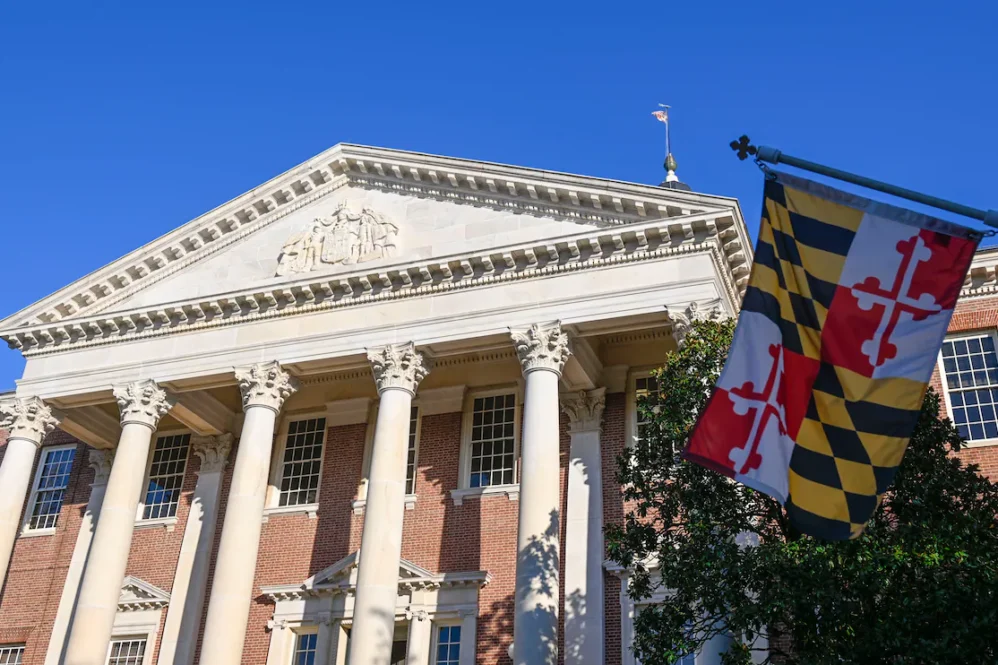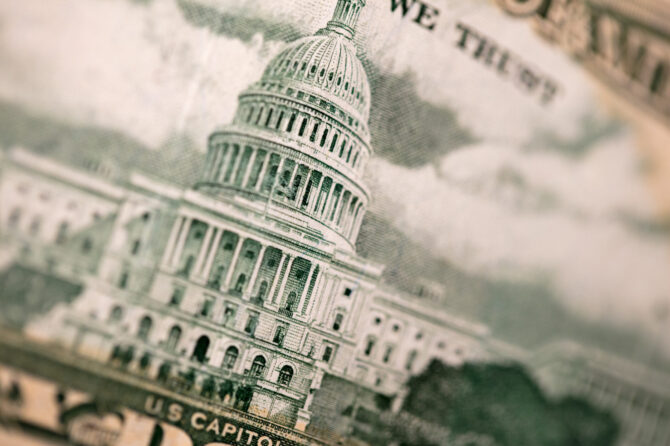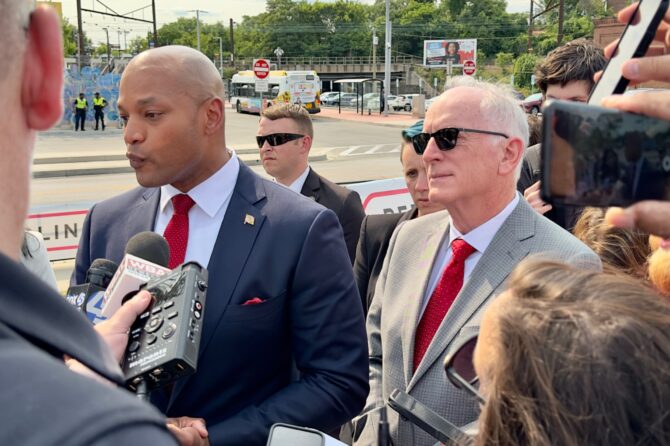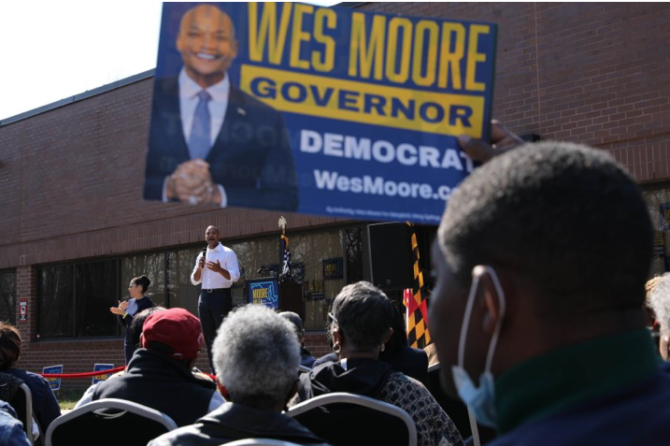WASHINGTON POST: A ‘millionaires’ tax, the end of corporate loopholes and other revenue ideas on the table to close Maryland’s long-standing budget trouble. The final day of the Maryland legislative session at the State House on April 10.
Maryland lawmakers grappling with multibillion-dollar budget shortfalls are weighing proposals to tax the rich. Levying a “millionaire’s tax,” targeting capital gains income from stock market earnings and broadening the estate tax are among many varied ideas under consideration to raise money for transportation and education, according to several leading Democratic lawmakers.
“Everything is broadly on the table,” said Senate Budget and Taxation Committee Chair Guy Guzzone (D-Howard).
“I don’t think anything’s off the table,” said House Ways and Means Committee Chair Vanessa Atterbeary (D-Howard). “This is the session to do something if we’re going to do it,” she said of the impending General Assembly session in January. “You know, some folks say, ‘wait till next session.’ I say rip the Band-Aid off, and let’s just solve the problem.”Maryland’s perplexing economic indicators — historically low unemployment but also stagnant growth — have not delivered the revenue needed to fund Democratic lawmakers’ ambitions. And while a flood of federal pandemic aid disguised the underlying problem, the help evaporated and leaders find themselves confronted with the politically fraught prospect of finding new money.
A coalition of 30 advocacy groups, the Maryland Fair Funding Coalition, has seized the moment, throwing $250,000 behind ad campaigns during the last few weeks of the year to build public support for changes they say would yield $1.6 billion more annually in revenue. Some liberal county executives who have long sought a tax code that shifted more tax burden to the businesses and the wealthy are advocating for it too.
Proposals under consideration by top Democrats vary from a comprehensive top-to-bottom shift of tax burden from the middle class to higher earners and corporations, to piecemeal ideas to tax online poker games or raise fees for government services. The prospect of tax increases are all but certain to land with a thud among Maryland Republicans, who are outnumbered 2 to 1 by Democrats.
“We’ve seen that in the past. That doesn’t work,” Senate Minority Leader Stephen S. Hershey Jr. (R-Queen Anne’s) said, pointing to Great Recession-era policies passed under former governor Martin O’Malley (D) that fueled support for his successor, two-term Republican Larry Hogan, as evidence that discontent about tax increases has consequences.
“O’Malley had the millionaire’s tax, and we lost more millionaires to other states,” Hershey said. “They have the capability of relocating and finding better states with better tax policies, whereas most people that will get affected by it don’t have the ability to do that.”
House Majority Leader David Moon (D-Montgomery) said he didn’t expect a quick resolution as lawmakers weigh the alternatives on the table: deep cuts to transportation spending or delaying other policy ambitions.
“We have a long session ahead of us, and it’s unclear at the moment where this conversation goes,” Moon said. “Folks are going to have to let the budget cuts — and the transportation budget cuts in particular — sink in as the session winds through and decide if they actually can stomach those sort of cuts.”
Moon said “it’s been a delayed conversation because the pandemic dumped enough federal stimulus on us that, you know, I think people forgot what the times of austerity and leaner budgets might look like,” Moon said. “For now, it’s a lot of concern and a lot of unknown about how this story ends.”
Tax talks are in early stage, as the Democrats who hold supermajorities in both chambers have not coalesced around a single tax-increase concept, nor sought even an agreement in principle with Gov. Wes Moore (D).
Moore’s public comments about the budget problems have focused on growing the economy to close the gap between the ruling party’s ambitions and the state’s balance sheets. He has warned about “discipline” in the upcoming year and having to “say no” to some key priorities. In a December speech, he warned that Maryland residents tell him they feel like they pay too much in taxes for what they receive in return.
This month he laid out $3.3 billion in proposed cuts to planned transportation spending, canceling big projects across the state and reducing maintenance for transit programs, as well as hiking parking fees at BWI Thurgood Marshall Airport and reducing the frequency of highway litter pickup. It sparked backlash even among Democratic allies who said the cuts went too far.
Meanwhile, the landmark education plan, known as the Blueprint for Maryland’s Future, ramps up over the next four years and will eventually offer free public preschool statewide, wraparound services and extra resources in high-poverty areas, among many other initiatives. But despite stashing away some of the federal aid from the pandemic to pay for it, within four years the Blueprint is expected to cost $1.8 billion more than the state has available each year.
Several lawmakers and aides said ongoing, behind-the-scenes conversations among top Democrats include more aggressively tax multistate corporations by using the “combined reporting” method, as more than quarter of other states do. Another idea proposes adding additional brackets with higher tax rates for households earning over $775,000 a year.
Other Democrats are floating more modest ideas such as letting residents play the lottery online.“We’re in a moment where people realize that what we’ve been doing isn’t working, and it’s not been able to ever provide the amount of money Maryland needs for transportation,” Montgomery County Executive Marc Elrich (D) said in an interview.
Elrich said he wants the legislature to grant local governments the ability to tax commercial and residential properties at different rates, a policy he said would allow Montgomery to raise revenue for transportation without directly hitting homeowners.
“We have a system where the middle class gets hammered, and you’ve got massively wealthy companies that pay nothing in taxes. It’s a farce. And, you know, it’s not democratic. It’s not good policy,” he said.
Anne Arundel County Executive Steuart Pittman (D), a staunch and outspoken proponent for tax reform, said in an interview he has repeatedly told state lawmakers for years that as they look for a revenue source to pay for the education program, they should go to the top of the income scale to get it.“There is more appetite than there’s ever been to make our tax structure more progressive to get revenue,” Pittman said.Maryland’s state budget problems involve more than transportation and education shortfalls. More broadly, a recent legislative analysis forecast revenue to grow by 3.3 percent over the next four years while planned spending grows by 4.8 percent.
In a statement to The Post, Moore spokesman Carter Elliott IV said the governor “is committed to exploring any and all options in collaboration with the dedicated leaders of the state legislature.”
The statement did not directly answer whether Moore supported placing more of the tax burden on wealthy residents and corporations, but it said he wanted “to invest in evidenced-backed policies that drive economic growth and good-paying jobs, ensure the education of Maryland’s children, and make our communities safer, all while making life a little easier for families struggling to keep up.”
The comprehensive tax change promoted by the Maryland Fair Funding Coalition seeks seven tax reform ideas that they say would ultimately cut taxes for the bottom two-thirds of Maryland households while increasing the tax burden on the top 1 percent by less than a percentage point. The largest revenue source would be through changes to corporate tax code, including requiring worldwide combined reporting and limiting large corporations from using the benefits of granted to LLCs under Maryland law.
“The state needs revenue, not to just maintain our commitment to the Blueprint, but to make sure that we’re not pitting education funding against housing, against child care, and against transportation,” said Kali Schumitz, a spokesperson for the Maryland Center on Economic Policy think tank, which is part of the coalition.
Maryland’s Democrats have been debating whether to raise taxes on corporations by changing a policy known as combined reporting for at least 15 years, with a landmark commission on the state’s business climate recommending in 2016 that lawmakers “do not adopt combined reporting and indicate clearly the intent not to do so.” Democratic legislative leaders say hard conversations are ahead about how to manage Moore’s proposed transportation cuts and the fiscal cliff in education spending, including increasing revenue or cutting other state spending.
“The cuts that we see the transportation budget are harsh and they’re tangible and will affect every Marylander,” said House Appropriations Chair Ben Barnes (D-Prince George’s). “I think it’s going to be incumbent upon us as a House to look at every means available to us to avoid them … I don’t think it’d be responsible for legislators to take any options off the table. And if groups have good ideas, I think it’s great for the process that they present them and we take them seriously.”










